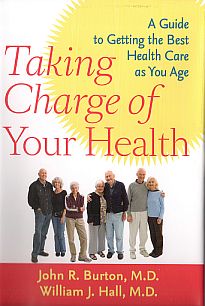One of the persistently nagging challenges of trying to improve health and health care for older Americans is the general public’s refusal to share our belief in this need.
We've raised many of the issues in this blog:
 - Most people are happy with their health care providers and don't appreciate the pervasive problems of quality and safety that exist for all patients, much less the specific failings of care for older adults.
- Most people are happy with their health care providers and don't appreciate the pervasive problems of quality and safety that exist for all patients, much less the specific failings of care for older adults.
- People don't want to be defined as "old," so why would they want care from geriatric specialists?
- Older people don't understand how much better off they could be if they had access to care that was more specifically targeted to deal with the issues of older adults; better organized to provide care; coordinated over time and across settings; and more comprehensive, drawing on the full range of medical, social, and community resources available
Into this breach have stepped two of the Foundation's longest standing geriatrician partners, Drs. William Hall of The University of Rochester's School of Medicine and Dentistry and John Burton of Johns Hopkins.


In their new book, Taking Charge of Your Health: A Guide to Getting the Best Health Care as You Age, they tackle all the critical issues. The authors explain that while they had initially planned to write for an audience of medical students, trying to communicate with the general public and older people themselves seemed a higher priority.
Drs. Hall and Burton try to demystify the intricacies of the "health care system" (e.g., the relationship between primary care generalists and specialists, the relationship of hospital care to sub-acute rehabilitation, etc.) as they work in meeting the common needs of older adults. The authors encourage every older person to find a skilled and empathetic primary care physician who understands and supports his or her personal values. (A simple test for attitudes and interest in caring for older people—ask for advice on special senior services like retirement communities or nursing homes.) And they try to explain why this is all so important:
Older persons require the best care that medicine has to offer. The older one is, the more this is true, for many reasons, but three in particular. First, with age, we gradually lose physiological “reserve” in all organ systems. Second, we tend to accumulate a variety of chronic illnesses. Third, seniors are the most heterogeneous (diverse) of any age group of patients. Thus, it is very important for your doctor to exercise sound judgment and carefully consider all options in any clinical situation you may encounter.
They go on to explain and defend the concept of the inter-professional health care team for the care of older people, which patients frequently view with initial suspicion:
In geriatric medicine, this [team care] is the norm rather than the exception. For you, this may at first seem confusing, but it generally is superior to care from one health care provider working alone...The value of team care is the accessibility, wisdom, judgment, and knowledge base is greater in a team than in a single practitioner functioning alone. However, for a team to function effectively there must be training and a clear system of communication that allows for frequent, highly efficient time in a “huddle.”
Finally, they advise those of us who are older (and those younger people among us who would like to be healthy when they grow old) to embrace our own responsibilities and promote our own health. These include: finding skilled health care professionals and working with them effectively, managing medications (including over-the-counter drugs and nutritional supplements), and maintaining a healthful weight and adequate physical activity.
Drs. Burton and Hall are two of the most illustrious, committed, and caring physicians I know. Their contributions to the care of older adults are too numerous to list, and the Foundation has counted on them for thoughtful leadership for more than 20 years. Given their central roles in advising the Foundation on its agenda, I was delighted to find they had written about so many key issues for the public. I hope that older adults and their loved ones take the time to read this book and consider the authors’ wise advice.
